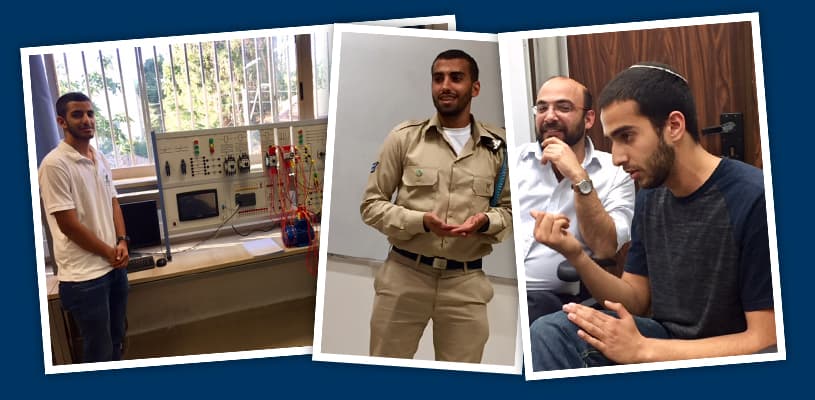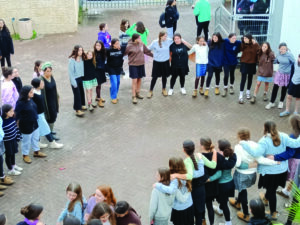How do you go from a school once known as the Red Jail now called the White House in just two years? Sometimes, it only takes one dynamic person who won’t take no for an answer. At AMIT Hammer Rehovot that person is Principal Rafi Maimon. When Rafi took over this school six years ago the building was in very poor condition. Kids were literally climbing over a fence to use bathrooms at a nearby mall. He realized that it was imperative to renovate the physical space before he could introduce new educational ideas. While working on major structural improvements, Rafi and his team began an effort to repair the emotional state of the students. At the time Rafi first took over, the school had a lot of violent incidences, happily, now there are none. The school serves at-risk students. Over 70% of the kids get therapy each week, with more than 100 hours provided to the entire student body weekly. All the therapies take place within the school and include animal and dog training, music and art, gardening, and personal coaching. It’s a tough crowd; 20% of students are very difficult, so, Rafi has created a 24/7 framework to keep them out of trouble. Any student can take advantage of the Bayit Cham (warm home) which has a social worker on staff at all times. Hammer Rehovot is also the first religious school that provides special education classes in every grade.
Nati, a student, told us that he was given a diagnosis of math dyslexia and therefore was exempt from learning math. No effort was made to address his issue. That was unacceptable and once he was provided with an individualized learning plan that addressed his needs. Nati began to study math, and now excels at it and is taking the 5-point math (highest level) course. He aspires to become a technician, join a combat unit in the IDF, and study engineering at university. Every student at AMIT Hammer is given an individualized learning plan that will lead them toward success. Principal Rafi told us about how the teachers took the initiative to develop an empowerment center for learning and an alternative learning center for children who need special attention.
There’s a lot to be proud of – just two weeks ago students won first place in a Holocaust knowledge competition against other Yeshivas and Ulpanat throughout Israel. One student is a Judo champion. As part of the curriculum, a strong emphasis is placed on chesed or volunteering. One of the most impressive volunteer activities is that students tutor autistic children so that they can have a Bar Mitzvah. Synagogues in Israel do not prepare children who have disabilities for a Bar Mitzvah. So, AMIT Hammer students took on the project and all the ceremonies are held in the synagogue at the school.
About three years ago Principal Rafi realized that his students needed additional education before entering the military and he created the Pre-Army Junior College program at AMIT Hammer Rehovot.
Today, 60-90 students are enrolled at the Junior College and last year the first graduating class achieved a 100% matriculation rate. This is quite impressive since most Jr. Colleges see half the students drop out before graduation. Many of the students need scholarships for the college and hold part-time jobs after school. Two tracks in electronics are offered to the students and upon graduation, they are automatically placed in the Israel Air Force. After service, many join the high-tech sector or continue to obtain a four-year degree from a university. I met Nir who is from the first graduating class. He told us that he felt well prepared to serve in the Air Force because of all the support that he received at the Junior College. Nir’s job is to tutor students in electronics at AMIT Beit Shemesh in grades 9-12 to prepare them for the army. When he completes his service, he wants to pursue a career in the field of electronics.
Many of the programs and the facilities at the Junior College are not funded by the Ministry of Education such as dormitories, food, mentoring, Shabbaton programs, and scholarships. All of these important needs are provided by AMIT. Currently, the Junior College is running at a large annual deficit.





